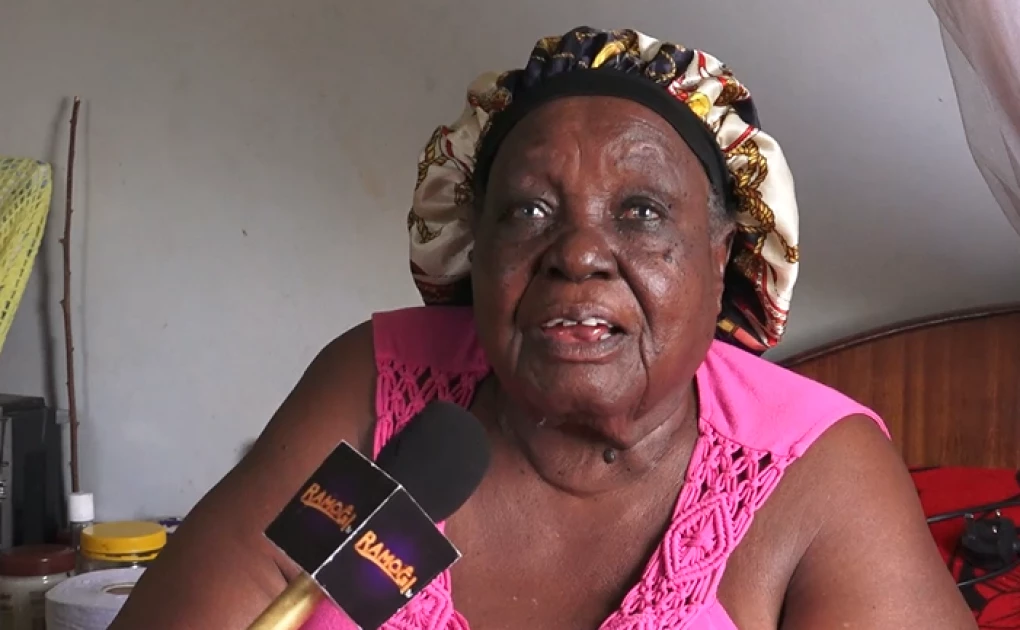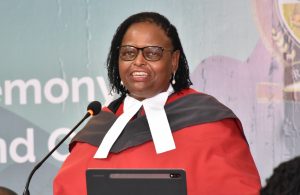Lawrence George Sagini was born at Gesonso, Kisii, on January 1, 1926, the first son of Ndemo Kibagendi and Esther Nyanganyi. His father was the president of the African Tribunal Courts in Kisii. Sagini belonged to the Mwabogonko clan, which traces its roots to Nyakundi, a fearless warrior who confronted the British expeditionary forces.

Sagini was baptised when he was a student at Mangu School. His wife, Mary, says her husband never failed to attend church even when he was ill. He helped construct Ria’Sagini Catholic Chapel named in his honour. He also supported other churches and self-help projects.
In appreciation, the Catholic Church in Kenya selected him, with seven others, to visit the Pope to be honoured with a “knighthood”. Paradoxically, the religious background of Sagini’s family was Seventh Day Adventist. His mother was an SDA deaconess when Sagini joined Mangu, a Catholic school. But she later converted to Catholicism, along with some members of the Ndemo family.
His father valued education and Sagini started primary education in 1934 at Isecha Sector School. His father and five wives would in turns meet Sagini halfway with porridge or food as he walked home from school. Those days, primary school pupils walked long distances to school. In 1937, Sagini joined Kisii Government African School and then proceeded to Kabaa Mangu Holy Ghost College. His schoolmates included Andrew Omanga, Moody Awori, Mwai Kibaki, Tom Mboya, Lawrence Oguda and Chrisantus Ogari.
One of the memorable events of the time was when missionaries discouraged students from using family names. This explains why officially, Sagini did not use his father’s name, Ndemo. After Mangu, Sagini went to Kagumo Teachers’ Training College in Nyeri and, after graduation in 1950, became a teacher, a headmaster and an education officer in Central and South Nyanza.
In 1957, he quit teaching to pursue a Bachelor of Arts degree in sociology and political science at Allegheny College in Pennsylvania, United States. He graduated with honours in 1959. Upon his return, Sagini rejoined the teaching profession and taught briefly at Asumbi Teachers College. In 1960, the Government appointed him assistant education officer, a position he held until 1961. He also became a member of the Provincial Council of the University of East Africa.
Sagini married Mary Nyaboke in 1950 and they had six children. Sagini tutored his children and siblings, especially in mathematics. The children did well and are university graduates. He also educated his brothers Paul Mong’are, Francis Mayieka, Salim Ndemo, Prof. Francis Abuga, Job Kibagendi and Dr Bitange Ndemo, the former Information and Communications Permanent Secretary. Just before independence, the need to increase constituencies and African representation in the Legislative Council arose. Consequently, Kisii was delinked from South Nyanza and became a separate constituency.
When a new constituency was created, a lawyer, James Nyamweya, declared his interest in the seat. Nyamweya was to later become a Cabinet Minister. As is his character, Sagini organised a meeting of elders of the Mwa’Bogonko clan. He proposed that the Abagusii elect Nyamweya, then an advocate of the High Court practising at Kisii. But a respected elder, Aminga Ayienda, stood up and rejected the proposal, arguing that the Abagusii would support a candidate from a lineage of renowned leaders. Since Sagini’s ancestry included great leaders, such as Nyakundi, the first chief the colonial administration nominated, the Abagusii picked Angwenyi Gichana instead, who was also was well educated.
Sagini had the merits to earn him the support of all Mwa’ clans, those from one ancestral root. The Mwa’ clans were expected to offer support. Eventually, the elders persuaded Sagini to contest the Kisii constituency Legco seat against Nyamweya (Nyaribari), Zephaniah Anyieni (Machoge-Bassi) and Meshak Mong’are (North Mugirango). The Sagini campaign was formidable.
As anticipated, clans cooperated because Sagini belonged to a renowned family of leaders. Then competition for supremacy between the two largest churches — Catholic and SDA — began. The Catholics supported Sagini from Kitutu Location and the SDA Nyamweya from Nyaribari Location.
Sagini’s symbol was a giraffe, in line with his physique and height. He had an additional advantage: he was exceptionally eloquent in English and Ekegusii. The symbol was a sculpture, which he placed on the roof of his Volkswagen during the campaign. The symbol was so well received that “giraffe” became his nickname — Sagini Esirori.
When confronted by cynical crowds, he would beat the retreat and say: “Vote for whomever you consider the best among us, but remember me, too. I am also your Kisii brother.” And if he met a hostile crowd, he praised the candidate the hecklers supported. But before leaving the stage, Sagini would quip: “Since I am tall, handsome and a son of the Kisii, I am sure that you will also spare some few ballot papers for me. Do you really want to elect your favourite candidate and leave me, his good friend, behind?” The crowd would roar back: “No!”
Sagini won the contest in the February, 1961, Legco elections as a Kadu member for Kisii constituency. In 1962, he was in the delegation of nationalists who travelled to London to attend the historic Lancaster House Conference.
When Kenya gained internal self-rule in 1963, Sagini was elected to the House of Representatives as MP for Kitutu West and named Minister for Natural Resources. In 1964 when Kenya became a Republic, he was made the Minister for Local Government, a position he held until 1969, when he lost the parliamentary seat.
Sagini believed in dialogue whenever important national issues emerged. He would convene a leaders’ conference at the Kisii County Hall, and seek consensus. Whenever political divisions arose nationally, Sagini resorted to this method, which kept the people united and solidly behind the Kenyatta government.
He avoided confrontational politics and was a staunch Kanu supporter, and a confidant of President Kenyatta. In private, Sagini called the President “monarch”. But in public, he referred to him endearingly as ‘Otwori’. And this became the Kisii nickname for Kenyatta.
In Kisii, the legendary Otwori O’Nyangena Ime was a brave warrior and leader who kept enemies at bay. Sagini’s friendship with the President made it possible for him to shield politicians, particularly those that were attracted to Oginga Odinga’s Kenya People’s Union, and the animosity generated over the assassination of politicians Mboya and JM Kariuki.
He reassured Kenyatta at every opportunity that he would mobilise elders to talk sense into politicians who were attracted by “subversive activities”. Kenyatta was impressed that Sagini’s style managed to moderate even the most ardent of political extremists.
When his former schoolmate Mboya was accused of scheming to take over the Government, Sagini remained a friend. One time, Mboya’s detractors sent Bruce McKenzie, the Minister for Agriculture, to ask Sagini to disown his friend. He declined and told the emissary to tell those concerned that his association with Mboya went back a long time.
He was neutral in the intrigues in Kanu and the Government. In 1966, when the party clipped Odinga’s wings by picking eight provincial vice-presidents of the party, Sagini was the Nyanza candidate. He beat Odinga. His level headedness made it possible to maintain good relations with Mboya and Odinga even when the two Nyanza leaders were political enemies.
When Sagini lost the 1969 elections, the feeling among Kisii leaders was that they had lost a unifying figure. For this reason, Kitutu East MP Makone Ombese offered to stand down for Sagini. After consulting his constituents, Ombese ferried a delegation to seek audience with President Kenyatta. After listening to their request, Kenyatta enquired whether another candidate would vie when the seat became vacant. Sagini confirmed that many contestants would emerge.
Kenyatta then advised the delegation that Kanu’s policy was not to impose leaders on the people, adding that such an attempt would lead to acrimony between the party and Kitutu East constituents. He then reassured the delegation that he would not abandon his friend, Sagini. After the meeting, Sagini was appointed General Sales Manager at Firestone, and later General Manager, before his nomination to Parliament.
After the 1992 elections, Kanu nominated Sagini to Parliament and he was thus an MP at the time of his death. In public service, Sagini was a role model. When he was the chairman of Kenya Power and Lighting Company and a nominated MP, company officials proposed to pay him an allowance. He declined it and said to family members who had asked him to reconsider the offer: ‘Tingotongeria omosori ara kabere’ (I cannot scoop soup from two plates at the same time). According to Sagini, he received allowances from Parliament and getting more from a parastatal was cheating the Government. When he was the general manager at Firestone, his son was involved in a car accident in the company’s car. Sagini rejected suggestions that he lie that he, and not the young man, was driving the car at the time of the accident. Instead, Sagini filed a report with Firestone, explaining what had happened — that his second son, Anthony, was the one who had hit the tree with the vehicle.
In another incident in the early 1970s, some foreign company executives took to him a Sh1 million bribe to secure them local government contracts. Sagini was so upset that he called the police. He also followed a strict routine. He woke up at 6am, exercised, ate breakfast and read. His wife says he never missed Time and Newsweek magazines since his university days. In fact, at the time of the accident which caused his death, Sagini was reading the Newsweek on top of his briefcase.
Sagini loved dancing, hunting and motorcycle rides, especially his enormous motorbike he had nicknamed Kerubo O’Nyariana. He and former Cabinet Minister Simeon Nyachae would ride it in turns during their younger days. The two were close friends and Nyachae married his sister. He also loved roasted maize. Ombese, a former Kitutu East MP, recalls he and Sagini arriving home at 1.30am from Nyeri where they had attended a meeting organised by Kiano. Sagini sent a worker to pluck maize from the shamba the same night. He always carried something roasted — roast maize, roast chicken and sausages to eat under a thorn tree, during his four regular stops on his way to or from Nairobi.
Sagini was always smart. When he left active politics, he served in various capacities. He was a board member of many parastatals, public committees, private companies, and charitable organisations. In 1970, Sagini was the secretary-general of the National Refugee Council of Kenya, and later became the chairman of the Maize and Produce Board.
In 1971, he was the general manager in charge of Government and Public Affairs at Firestone (EA) Limited. Sagini was also a director at Securicor Kenya Ltd (now G4S), East Africa Industries, Tana and Athi River Development Authority and a charity, Wings of Progress. He was also the chairman of the Agricultural Development Corporation, Kenya Seed Company, Presidential Commission Investigating Indiscipline in Secondary Schools, and the chairman of the Council of the University of Nairobi. In 1969, President Kenyatta awarded him the Elder of the Order of the Golden Heart (EGH). In the same year, when he was Minister for Local Government, his alma mater — the University of Allegheny — awarded him an honorary Doctor of Laws (LLD) degree.
Eventually, a road accident cut short his life. A lorry whose driver had lost control of the vehicle, hit Sagini’s car from behind at Chepseon market on the Nakuru-Kericho road on August 1, 1995. He died two days later.



















